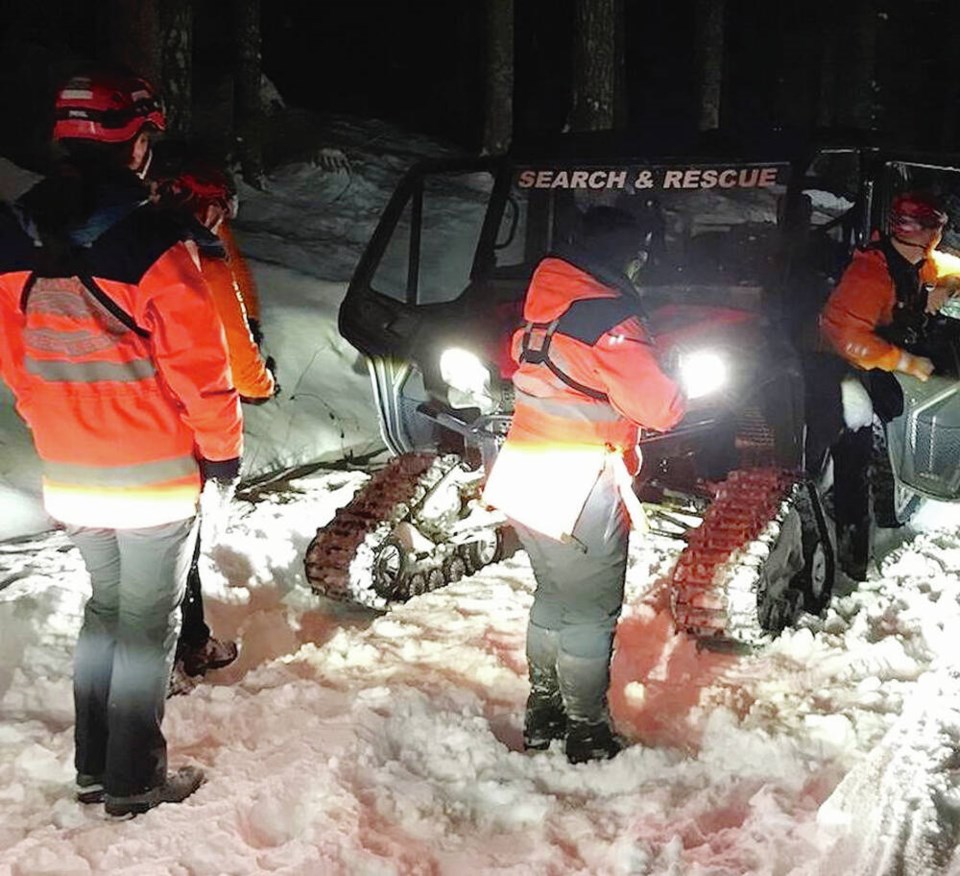When a four-by-four SUV went off a logging road and down an embankment in deep snow south of Nanoose Bay on Wednesday night, the two men inside had no idea that an iPhone had automatically summoned searchers.
The phone’s satellite-linked emergency alert system fired off latitude and longitude co-ordinates of the accident scene, allowing searchers to get there in a little more than an hour, said Nick Rivers, president of the Qualicum Beach-based Arrowsmith Search and Rescue and a search manager.
Without the technology, the two men would have faced a “long, challenging walk out if they could have made it,” said Rivers, who noted there is no cell service in the area.
“But my guess is they would have succumbed to hypothermia before getting out,” he said Friday.
“Having the ability for people to send a message, or for it to automatically do it when there is no cell service, is definitely a massive safety improvement for backcountry users.”
The men would have had to walk about 10 kilometres in -3 C cold through Mosaic’s Northwest Bay Division to a gated gravel pit connected to logging roads leading to the highway, he said.
A search wouldn’t have been launched until the men were reported missing, and it would have covered a large area, he said.
Oceanside RCMP contacted search and rescue after being notified by Apple that a crash alert had been activated, and a team of 17 search and rescue volunteers responded to the call, which came in shortly after 8 p.m. on Wednesday.
An RCMP drone equipped with heat sensors found a heat source. Rivers said drone images showed a vehicle and what appeared to be two people.
The team responded with a side-by-side vehicle fitted with tracks to get through the snow. It was hauled on a trailer to the closest spot. Two trucks with chains went in through a different route to get to the scene.
When searchers arrived, one man had climbed up the embankment while another was still in the process of doing so. Their vehicle had dropped three to 4.5 metres, Rivers said.
The men, who suffered minor injuries, were taken out of the woods and met an ambulance.
It was the first time the Arrowsmith search and rescue group had been sent out in response to an automatic satellite connection with a cellphone, although it has happened elsewhere in the province, Rivers said.
There have been some false activations when, for example, people have been out on quad off-road vehicles or performing a jump while on a bike, he said.
Even so, “It’s a great piece of tech to carry in a pocket that can absolutely save your life without knowing it,” Rivers said.
IPhones 14 or later with iOS16 or later feature crash detection, as do some Apple watches. Google Pixel also has car-crash detection.
Meanwhile, Arrowsmith Search and Rescue is about to launch a fundraising campaign to equip a second side-by-side rescue vehicle. The cost is about $30,000.
The non-profit organization already owns the basic vehicle but it comes without essential equipment, such as a windshield, tracks, roof, doors, winch and medical gear for carrying a stretcher.
• For more information go to .
>>> To comment on this article, write a letter to the editor: [email protected]




